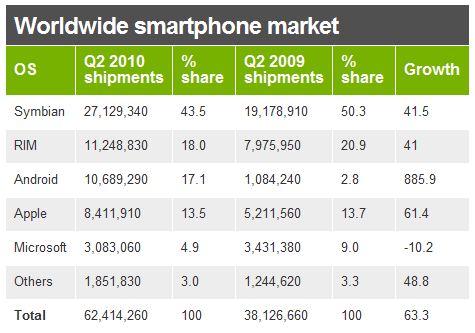Spillikins #79. Blackberry and Spy Games around RIM
Contents:
- Smartphone Market in the Second Quarter of 2010: Android Attacks
- Blackberry Falls Out of Grace with the European Union
- MeeGo: Leaked Video and Some Words about the Release Date
Smartphone Market in the Second Quarter of 2010: Android Attacks
The best way to assess the market development is to rely on independent data. When manufactures claim they retain or increase their market shares it is often not true. The report of Canalys on the smartphone market in the second quarter of 2010 puts everything into perspective. This report, or to be more precise, its abstracts made quite a splash and all news headlines highlighted a record breaking growth rate of 886 per cent for Android models during the year. It's a breathtaking figure, which was immediately disputed in terms of the actual market share of Android. It's a common knowledge that in 2009 Android sales were minimal and it was quite easy to record a growth from scratch. How considerable are Android sales and can this OS threat other players? In both cases the answer is affirmative.
Android market share is 17%, while RIM has 18%, but it has been around for years and offers only smartphones. There are two companies of the kind - RIM and HTC. Other manufacturers offer ordinary phones as well. You can remember HTC Smart, but its influence is too insignificant and it is just an experiment.
Nokia's Symbian is still a leader with 43.5% of the market, but a year ago it had 50.3%. Nokia sales are based on inexpensive smartphones purchased as ordinary handsets. Accessible price is a key factor for Nokia survival now. Unfortunately, in terms of technology the company is losing ground.
Let's look at the figures and forecast the future.

Symbian's future looks uncertain, because the price decrease has its limits and the competition in the low price range will heat up in 2011 when MediaTek will offer an inexpensive chipset for smartphones, especially the models build on Android. This will allow selling devices at the retail price of around $100-120. Android market will get a new push with Symbian on the defensive. Nokia will have to lower the prices again, but the bottom prices could be reached by then. In 2010-2011 nothing will change the situation around Symbian. The market is ever changing and Symbian may have a break only in 2012 if the right decisions are taken today. So far we have not seen any move in the right direction.
RIM is enjoying a good 2010 with booming sales, but they do not have any USPs similar to Apple and HTC. That is why the ban on RIM services may influence the company negatively. RIM will experience growth, but it is not going to be dramatic, so its market share will remain the same or may even go down a bit.
Apple has reached a pivotal decision time whether to keep only one model on the market or offer Apple iPhone Nano, which has been ready for a couple of years already. The margin is maximum, sales grow, but Apple has already used all growth opportunities and saturated its niche. Advertisement or aggressive PR cannot increase the sales of Apple iPhone 4 ten times, because the price is high. The company has managed to attract all potential customers in its target segment and now it is time to move to other price ranges. It may happen in a year when the growth will slow down even further. The introduction of an inexpensive Apple phone (priced at 50% of Apple iPhone 4) will influence the sales of the flagship model. Its growth will stop and stabilize at best. The company will offer an accessible alternative, but it will be enough, because in its segment Apple leads in terms of revenues and easily beats other manufacturers in this respect. The key issue here is to fight for the market share and make people believe that it is important for Apple or concentrate on revenues instead of sales.
Microsoft will be happy in 2011. The sales will go up courtesy of Windows Phone 7. The sales growth will be based not on the universal acclaim of the products, but will be fuelled by corporate users. Even now Microsoft enjoys some popularity due to the overall brand recognition and not because of OS features.
And finally we have to mention Android. Can an 886% growth be sustainable? Of course not. With every coming year growth rates will be going down, but the market share will markedly increase. Even today, according to Eric Schmidt, 200,000 Android phones are activated every day. The future is bright for Android in 2010-2011, because this OS will offer users new experience they need. Sales figures do not lie, but indicate the most popular devices. We have to mention that Android is still rather expensive and inexpensive phones will appear soon and give one more boost to the OS.
Even without the forthcoming Android 3.0 the momentum in 2010 can be enough for Android to grow fast, but the development of the new update is continuing. It may influence the plans and prospects of many market players.
Back to the table of contents >>>
Blackberry Falls Out of Grace with the European Union
A range of scandals around RIM may adversely affect the company's fortunes. RIM has nobody to blame, because the countries campaigning against Blackberry services are acting quite legally. For example such services will be banned in the UAE on October 11. The ban applies not only to the sales and servicing of the new phones, but completely prohibits Blackberry services in the country. It was not highlighted in the press, but the main point is that the countries planning to ban Blackberry want not only to protect their countries from new services being offered but to disconnect the existing subscribers. This is a serious threat for RIM.
Russia was a no go area for Blackberry on security grounds as well. The Federal Security Service of the Russian Federation wanted to control the correspondence of Blackberry subscribers, but the encoding made it impossible. After prolonged negotiations the compromise was reached. The servers were installed in Russia with black boxes which send all traffic to the FSS without encoding. It was enough for the FSS though Blackberry devices signed up for the service abroad, but used in Russia cannot be fully controlled. The conversations can be monitored, but the traffic is still encoded.
In India RIM had to offer concessions as well after the local authorities became unhappy. I think the compromise could have been based on the abovementioned Russian scheme.
In Saudi Arabia, Indonesia and other countries Blackberry services can also be banned, because the correspondence cannot be controlled. But the heaviest blow for RIM was delivered by the European Commission, which prohibited the use of Blackberry phones for its 32 thousand employees on security grounds. There were no accusations against RIM. It is a simple ban. Privately, the same ban exists in Russia as well where mobile carriers cannot sell Blackberry phones to civil servants. The same applies to power and security departments. Do they know more than rank-and-file Blackberry users?
I have to say that I do not like conspiracy theories, but in this story all participants are likely to have some hidden motives. Countries with friendly relations often exchange security and intelligence information. In the Anglosphere the pool of such friendly nations includes the USA, Canada, Australia, New Zealand and the UK (who also own ECHELON system used to collect intelligence data). RIM is a Canadian company while the bulk of its users are in the US. These are the entrepreneurs, civil servants and even the President of the United States. Taking into account the obsession of the US intelligence services with encoding and their desire to have all keys to communication devices on the market I suspect that RIM could have given them the respective keys. Otherwise, the company would not have worked on the market, especially with the civil servants.
I don't think they intercept all conversations of Blackberry users and read their correspondence in real time, but I mean they should have a potential option to do it in connection with certain persons. It may be carried out strictly in compliance with the US law. But it is enough for other countries to get nervous and act accordingly.
We only have to guess what caused such uproar. There must have been something to lead to the backlash we witnessed in every country we mentioned. And then was the European Commission as well. That's not the end though. Last week we learned that the US State Department conducted negotiations with numerous countries not to ban Blackberry services (the information was spread by ITAR-TASS and others). Officially, the motives are to ensure that the work of the US diplomats and civil servants abroad is not interrupted, because they use the services. Do you believe it?
I don't. Diplomatic missions use secure links for the communication of civil servants and not Blackberry or anything similar. On the other hand it is not clear why the US State Department should protect a Canadian company. I think the US intelligence services do not want to lose an environment where they can easily find entrepreneurs or influential people and get a full access to their data and correspondence. This opportunity is worth fighting for, even publicly.
I am sure the scandal will subside. The fact that it became public means that behind the scene something serious must have happened to upset several governments and the European Commission. We will hardly ever learn about it, though. Anyway, it was a serious blow for RIM, which shows that he service is not completely secure, even if the perpetrator is the state in this case.
Back to the table of contents >>>
MeeGo: Leaked Video and Some Words about the Release Date
Last week on the web appeared a video with MeeGo interface for phones. This is a true picture of what you will see on Nokia N9. It was a demo video for Nokia World in September. Probably it was received by PR agencies for translation and they leaked it. Nokia reacted quickly and the video disappeared from YouTube. As we know anything that gets on the web cannot be hidden by any company. You can find a video on one of the services, but the most interesting is MeeGo interface.
On Nokia Blog this video was used for screenshots. The original article with screenshots can be found here.
The interface is nice, but hardly a revolutionary. The ideas have been already used in Android and Maemo. Let's see how relevant the interface will remain in November compared to other solutions, first of all Android. Unfortunately, phone features in MeeGo trail Symbian^3, but are slightly better than in Nokia N900. It is too early to discuss the interface as we should wait for the mid August firmware.
I am also curious where the next leakage will originate. I do not believe that Nokia can keep a secret. Not now, when the company is losing its position every week.
Back to the table of contents >>>
Do you want to talk about this? Please, go to our Forum and let your opinion to be known to the author and everybody else.
Related links
Eldar Murtazin ([email protected])
 Twitter Twitter
 Livejournal Livejournal
Translated by Maxim Antonenko ([email protected])
Published — 10 August 2010
Have something to add?! Write us... [email protected]
|













